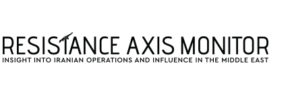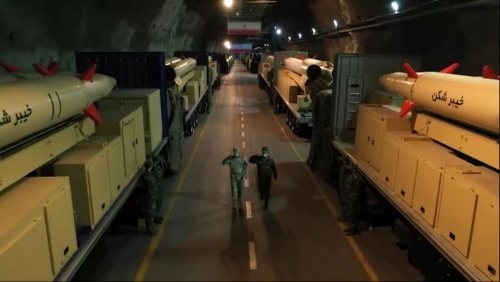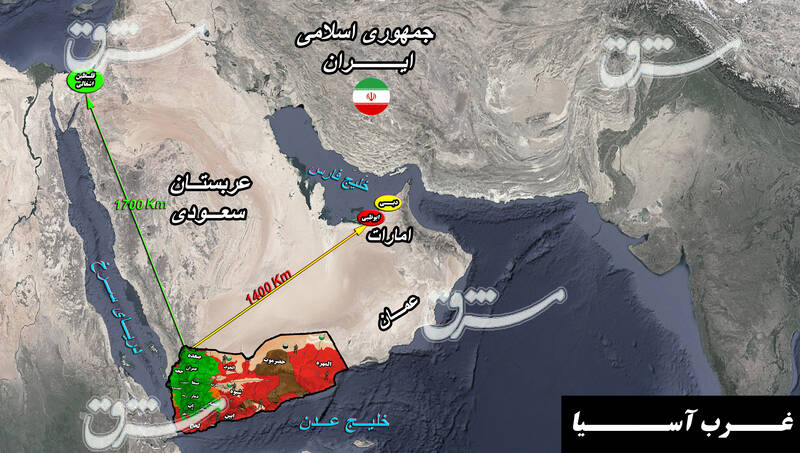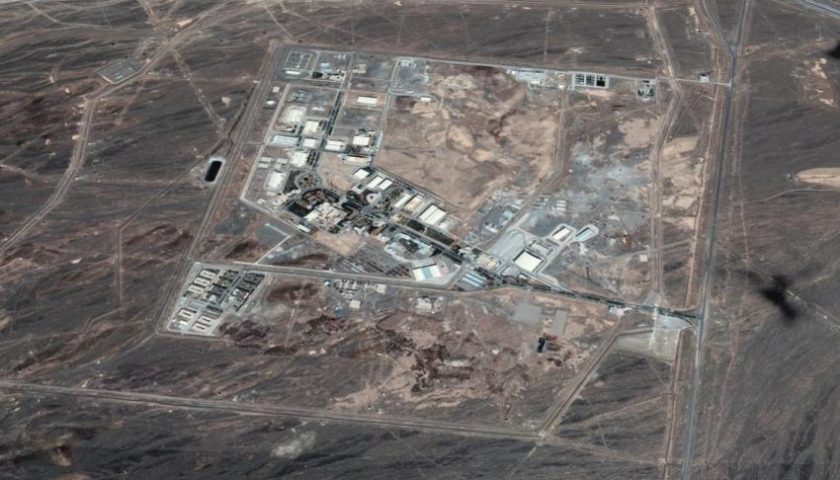The Resistance Axis Monitor News Bulletin delivers periodic rounds ups of important developments from Arabic, Hebrew and Persian sources that have not been covered or covered as extensively in Western reporting. While the bulletin focuses on Iranian regional intervention and its proxies in the Middle East, this coverage extends beyond to include politics, military, society and culture. Please subscribe on the right hand side to receive the latest News Bulletin as well as our analysis in your e-mail.
Iran
Kayhan Expects Biden To Continue Much of Trump’s Foreign Policies On 21 January, Kayhan, the chief editor of which is appointed by the Supreme Leader, released an editorial saying that while the Biden administration may change “some tactics” compared to its predecessor, the core foreign policy directions would be the same. Quoting pundit Noam Chomsky, the editorial said that US presidents are “one ring” in a chain of decision-makers that include “oil cartels, Israeli lobbyists, etc.” It cited incoming Secretary of State Anthony Blinken’s recognition of Jerusalem as Israel’s capital and the Biden administration recognizing Venezuelan opposition Juan Guaidó as examples. (Kayhan)
Kayhan: ‘Biden’s Inauguration in Abandoned City With Threat of Gun’ On 21 January, Kayhan published a report on the inauguration of President Joe Biden, saying that it took place in an “abandoned city with the threat of gun.” (Kayhan)
E’temad Calls End of Trump Term ‘End of Nightmare’ On 21 January, Reformist E’temad ran an article on its front page that called the end to the Trump administration the “end of a nightmare.” It reported that President Joseph Biden promised to return to “international organizations and agreements” that former President Donald Trump left, such as rejoining Paris climate treatment and the World Health Organization. (E’temad)
Soleimani’s Daughter Mocks Trump As He Leaves Office On 21 January, Zeynab Soleimani, the daughter of the late general Qasem, tweeted in English: “Mr. Trump, you murdered my father, the General who led the victorious war against ISIS/Al-Qaeda, with the perverse hope that you will be seen as some sort of hero. But instead you are defeated, isolated & broken – viewed not as a hero, but one who lives in fear of foes. The irony.” (Twitter)
Khamene’i Website Promises ‘Revenge’ Against Trump For Killing Soleimani On 21 January, website of Supreme Leader Ayatollah Ali Khamene’i posted an image showing a shadow over former President Trump playing on a golf course. The writing says that “revenge is certain” for the assassination of former Qods Force chief Qasem Soleimani. It carries a recent statement from Khamene’i who vowed that the Soleimani’s “killer” and those who helped carry it out would face vengeance. (Office For The Preservation and Publication of the Works of Grand Ayatollah Khamene’i)
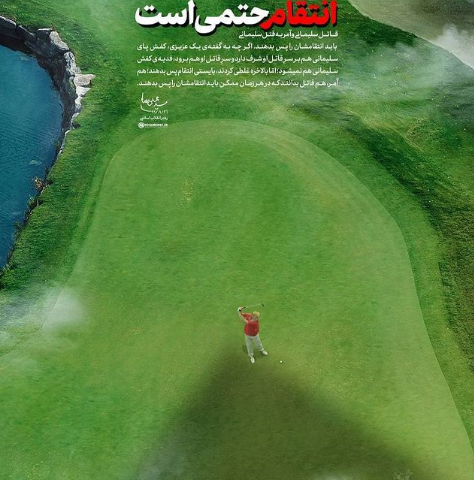
95 Percent of Workers Live Below Poverty Line On 19 January, IRGC-linked Tasnim News reported that a workers association official has said 95 percent of Iranian workers live under the poverty line, accusing the Rouhani administration’s policies of crushing workers. (Tasnim News)
Tehran Stock Market Reports Loss as Price of Dollar Reaches 23,000 TumanOver the past week, Iran’s major financial markets reported record lows since August 2020, when the stock market soared to 2 million points and the price of the country’s currency reached 21,000 tuman to the dollar on the free market. On 18 January, TEDPIX, the main index on the Tehran Stock Exchange (TSE), dropped 6.5 percent (or roughly 36,000 points). In particular, stocks of petrochemical, steel production and mining experienced the biggest losses. Over the past week, gold prices also plummeted, trading at less than 920,000 tuman. On 19 January, economic daily Donya-ye Eqtesad reported on a decrease in the housing market, as well. Since the crash, reports indicated that on 20 January, the last day of the trading week in Iran, TEDPIX gained 33,260 points, climbing 2.9 percent, pushing the trading benchmark to 1,183,978 points on the TSE. Meanwhile, the value of Iran’s currency has somewhat increased, currently trading at roughly 23,000 tuman to the dollar. (The Ruhani administration has implemented policies in order to offer a subsidized exchange rate at 4,200 tuman to the dollar for certain importers and exporters.)
The country’s current budget deficit and financial woes have caused concern among the public, as well as ongoing spats between the Majles (Parliament) and the Ruhani administration. In the wake of the market crash, which spurred protests in front of the TSE in Tehran, the head of TSE and the Securities and Exchange Organization of Iran (SEO) quit both of his posts, according to the semi-official Islamic Republic News Agency. Responding to the crash, on 16 January, Deputy Majles Speaker Amir-Hoseyn Ghazizadeh said that, “If you see stocks falling it is because of fear in the market, wrong polices, and because large companies take advantage of the stock market so they can buy stocks at a lower price.” He also called the subsidized exchange rate a main factor behind “economic corruption and abuse” in the country. The Ruhani administration has used the TSE to make up for its budget deficit by increasing the sale of state-owned companies on the market and by issuing more bonds. The Central Bank of Iran reported that it plans to continue these policies through August to offset the government’s debt. (Navasan, Donya-e Eqtesad, Jam-e Jam, Asr-e Iran, IRNA, Mehr News, CBI)
Supreme Leader’s Website Releases Interviews With Top Officials on Nuclear Accord, US Sanctions The website of Supreme Leader Ayatollah Ali Khamene’i has released a series of interviews with a number of top officials and advisers to Khamene’i order to explain in detail Tehran’s official position on the Joint Comprehensive Plan of Action (JCPOA), also known as the Iran deal, and U.S. sanctions. The series is called “firm word,” referring to Khamene’i’s January 8 speech in which he said that Tehran’s “final and firm word” was the lifting of U.S. sanctions, and that “we have no rush about the U.S. returning to the JCPOA.” The Trump Administration exited the deal in 2018 and re-imposed sanctions with the stated objectives for more restrictions on the nuclear program, as well as ballistic missiles and regional intervention.
Published between January 11to 14, the website interviewed the Supreme Leader’s foreign policy adviser Ali Akbar Velayati, Atomic Energy Organization of Iran (AEOI) director Ali Akbar Salehi, Foreign Minister Javad Zarif, Parliament Speaker and JCPOA Supervision Committee member Mohammad Baqer Qalibaf, Supreme Leader adviser and former Parliament speaker Ali Larijani, Foreign Relations Strategic Council director and JCPOA Supervision Committee member Kamal Kharrazi,and the Supreme Leader’s Representative in the Supreme National Security Council and JCPOA Supervision Committee member Sa’id Jalili (Jalili ran for president in 2013).
Overall, these officials ruled out tying a US return to the JCPOA and lifting of sanctions to new restrictions such as on ballistic missiles and regional activities. They agreed that the top priorities for Tehran were lifting banking sanctions and oil embargo. Figures like Kharrazi and Jalili said that recent Iranian actions such as announcing 20 percent uranium enrichment in a Parliament bill should have been done earlier, apparently trying to shoulder away responsibility from Khamene’i, the ultimate decision-maker, and direct their criticism toward the Ruhani administration. Administration officials like Zarif said that while they disagreed initially with the Parliament, they obeyed the Supreme Leader once he ordered the bill’s implementation. All officials agreed that Tehran should seek compensations for damages sustained following the U.S. exit from the JCPOA, but that this should take place at a later stage as Khamene’i said (earlier, some Iranian officials floated compensation should be paid upfront).
Velayati emphasized that the US has to lift sanctions that it imposed following its 2018 exit from the JCPOA in order to return to the JCPOA. He said that the US has to give the “right” to Iran to doubt the “Americans’ commitment,” adding that the next US administrations would have to be faithful to the commitment that their predecessors struck. He added that the JCPOA’s terms are “for a limited time” and that “these limitations would be lifted from 2025 forward.” Velayati said that the Islamic Republic would not pursue nuclear weapons. He also said that “some” of Khamene’i’s demands in a 2015 letteer on the conditional implementation of the JCPOA were not implemented, which would have benefited the Islamic Republic if they had been. Velayati furthermore called for eliminating snapback mechanism, a process through which sanctions would snapback on Iran, in future talks, adding that Khamene’i opposed them from the start.
Salehi, whose role in the nuclear deal goes back to when he was foreign minister during the second Ahmadinejad administration, said that if banking sanctions and oil embargo is lifted, “then we don’t have a problem and can do our work.” He said that if the US wants to return to the JCPOA this time, the Islamic Republic must “gain the necessary trust.” He ruled out additional provisions in the JCPOA. He said the Foreign Ministry has to work with other agencies to calculate damages Iran sustained since the U.S. exit from the JCPOA in 2018 to pursue for reparation.
Zarif said that the Trump administration has complicated lifting nuclear sanctions, for instance by adding terrorism designations to the Central Bank of Iran and the Oil Ministry. He emphasized that the steps that Iran has taken with regards to reducing its nuclear commitments have been coordinated with the Supreme JCPOA Supervision Committee. He said that “Europeans and Americans must know that we will no negotiate against what we negotiated once.”
Qalibaf stressed that the goal of any talks must be lifting sanctions, primarily oil export and international banking transactions. He Iran’s said the Parliament bill that would gradually reduce Iran’s nuclear commitments “created power” and helped its hand in negotiations with regards to JCPOA parties. He called for changing the Iranian economy so that U.S. sanctions would no longer be effective, citing Iran’s reliance on oil exports. Qalibaf said that Iran’s crude oil exports constitute less than 20 percent of the Iranian economy. He criticized the administration management for many internal issues like inflation and steep rise in price of goods, despite allocation funds for importing certain goods at a lower foreign exchange rate.
Kharrazi said the US would have to lift sanctions before returning to the JCPOA. He rejected suggestions by figures close to President Biden that Iran must also discuss its missile program and regional activities if Washington is to return to the JCPOA, saying that the JCPOA “has nothing to do” with those issues. Kharrazi said Tehran would have to wait and see what the US system decides with regards to the JCPOA, since the decision-makers include Congress, public opinion, “lobbyists and foreign countries.” He concluded that “we don’t want to live in isolation,” and that the Islamic Republic is open to “win-win” negotiations but that it would not response to “pressure.” He praised Tehran’s regional influence and characterized defensive prowess as strong.
Jalili stressed that the entire purpose of the nuclear deal was to lift sanctions against Iran, and that lifting oil embargo and banking sanctions are the top priorities moving forward. He expressed skepticism about change in approach toward Tehran by the Biden administration, saying that many officials were architects of sanctions during the terms of President Barack Obama. Jalili said that while the Islamic Republic should strive for good relations with the world, it should focus its efforts on regional countries and others like China and Russia. He said that ties with such countries, such as a country depending on an Iranian export, can help reduce the effects of U.S. sanctions. (Office For the Preservation and Publication of the Works of Grand Ayatollah Khamene’i)
Lebanon
Hizballah, Free Patriotic Movement Moving Towards Renewing Alliance, Updating February 2006 Understanding MTV Lebanon reported that Hizballah and the Free Patriotic Movement are moving toward renewing their alliance and updating the February 2006 Understanding which made them partners. The two parties formed a bilateral committee to reevaluate the 2006 Understanding and update it in light of the domestic and regional developments which have occurred in the intervening fifteen years.
The Hizballah-FPM dialogue committee was formed 1 month ago, but has yet to meet. However, the two sides have already agreed on six points to be discussed, in light of positions articulated by Hizballah Secretary-General Hassan Nasrallah during recent speeches, FPM chairman Gebran Bassil, and other senior leaders from both parties.
The points to be negotiated as part of the updated Hizballah-FPM Understanding are:
1) Lebanon’s future, and it regional role in light of domestic, regional, and international developments
2) Fighting domestic political corruption, which will involve reforming the Lebanese political system, and continuing the development of the Taif Agreement – which ended Lebanon’s 15-year civil war and reformulated Lebanese power sharing to redistribute power concentrated among Christians, particularly Maronites, to Muslims who had demographically overtaken them.
3) Hizballah’s regional role, and a National Defense Strategy in light of the group’s military interventions abroad over the past 10 years
5) Relations between both parties’ popular base, especially given the problems that have arisen in recent years between them and created gaps between Hizballah and FPM, and impacted them in the political, social, and media arenas. As a remedial measure, the parties intend to continue developing their bilateral relations on all levels.
6) Approaching regional developments, particularly in light of new regional alliances occurring in the wake of recent Arab-Israeli normalization treaties, the future of the conflict with the “Israeli enemy,” issues of Lebanese neutrality, and other international and regional developments. (MTV Lebanon)
Hizballah Continues to Distribute Humanitarian Aid to Needy Lebanese Hizballah continues its distribution of aid to needy Lebanese families in order to regain its tarnished image as the protector of the country’s poor, particularly among its Shiite base.
The group provided diesel fuel for heating to 20,000 families in the Beqaa Valley and Baalbek-Hermel, and 1,000 families in the western Beqaa. Hizballah conducted the fuel distribution over the course of 3 days, to coincide with the start of winter snowstorms, distributing 3.5 million liters of diesel fuel in the Beqaa/Baalbek-Hermel, and another 216,000 liters in the Western Beqaa. The initiative cost the group 3 Billion Lebanese Pounds, or approximately $2 million USD, at the exchange rate of 1,500 LBP to 1 USD. Hizballah’s Beqaa media official Ahmad Rayya said fuel would last each family for 1 month, and this initiative followed “several” others to provide aid and food to residents of the region, which “will always be Hizballah’s priority.”
According to Lebanon 24, the group did not import the fuel from Iran, but purchased it on the Lebanese market. Sources close to Hizballah claimed it would continue such distributions on a monthly basis if Lebanon’s economic deterioration continued, and that the party does not currently need to import fuel for this purpose.
The group also delivered food packages to needy families in predominantly-Sunni Akkar and northern Lebanon.
Hizballah also opened an “Agricultural Jihad Center” in the village of Maarekeh in south Lebanon to aid locals to grow their own food, and develop any fallow or unused land. The move was a response to Secretary-General Hassan Nasrallah’s call in July 2020 to promote agricultural and manufacturing self-sufficiency, particularly among Hizballah’s base, to counter – or at least blunt – the impact of Lebanon’s ongoing economic collapse.
Per a report in Hizballah’s Al-Ahednewspaper, the Center’s role is to finance the provision of seeds and impart agricultural knowledge on residents desiring to participate. The effort is being financed and supported through Hizballah’s Jihad al-Binaa social development arm and its Qardh al-Hassan, which provides small loans. (Al-Ahed, Lebanon 24)
Lebanese UN Official Defends Hizballah Against Terrorism Accusations Lebanese Permanent Representative to the United Nations Human Rights Council Salim Baddoura stressed that Hizballah is a component of Lebanon, and that it represents a large swathe of the Lebanese people. He also stressed that the group was a critical part of the country’s national resistance and its political life. Baddoura called accusations of terrorism against Hizballah “worthless defamation.”
Syria
Russian FM Sergey Lavrov Tries to Position Moscow as Responsible Syria Broker Russian Foreign Minister Sergey Lavrov has been attempting to position his country as a responsible broker to all sides on Syria. In a recent press conference on January 18, Russia Today Arabic reported that Lavrov had extended an olive branch to U.S. forces in Syria, asking them not to target Assad regime sites. He also tried to appear to address Israeli concerns about Iranian entrenchment in Syria, somewhat implausibly asking Israel to “submit evidence proving the truth of this, so that we can deal with it.”
Then, on January 21, Lavrov met with representatives of the Moscow- and Cairo-based opposition, stressing Russia’s “readiness” to encourage comprehensive dialogue between all Syrian factions to stabilize the situation in Syria. (Russia Today Arabic)
Al-Monitor: Iranian Forces Redeploy, Transfer Weaponry to Residential Neighborhoods in Eastern Syria
On January 16, Al-Monitor reported Iranian forces and affiliated militias in Deir ez-Zor province in eastern Syria carried out new redeployment and repositioning operations after their military sites and barracks were subjected to Israeli airstrikes on January 13.
The redeployment included evacuating the sites affected by the bombing, emptying several weapons depots, and moving weapons to other locations in various neighborhoods in the cities of Deir ez-Zor, Abu Kamal and Mayadeen. It also included the pro-Iranian militias transferring the bulk of their members and military equipment to residential neighborhoods in Deir ez-Zor, Al-Bukamal, and Al-Mayadin, including transferring rockets and heavy weapons into tunnels in the area. (Al-Monitor, Naher Media)
New Israeli Airstrikes in Syria in Outskirts of Hama Official Syrian state media outlets reported on January 21 that the Israel Air Force had conducted a strike on the outskirts of Hama. Per SANA, a source within the Syrian Arab Army stated that at approximately 4 AM on January 22, 2020, “the Israeli enemy carried out an aerial aggression by firing volleys of rockets from over the Lebanese city of Tripoli [in northern Lebanon], aiming at targets in the area of Hama.” The source claimed that Syrian army air defenses were activated to intercept the missile strikes, and “downed most of the missiles.”
The source also claimed that “the Israeli aerial aggression that targeted Hama at dawn today led to the martyrdom of a family, consisting of a father, mother, and two children, and wounded two others – a woman, two children, and an elderly man – in addition to destroying three civilian houses at the western end of the city of Hama.” Israel, per its usual policy, has remained mum on the strike.
However, the London-based Syrian Observatory for Human Rights (SOHR), which has been suspected of grossly exaggerated casualty numbers in the past, claimed that Hizballah and pro-Iranian militias were the target of the Israeli strike, and that shrapnel from the air defense systems attempting to the Israeli strike had killed the aforementioned family and damaged nearby civilian buildings. SOHR claimed that the targets of the Israeli strike had been “completely destroyed” but did not give any numbers of casualties from among pro-Iranian militias or Hizballah. (SANA, SOHR)
Iraq
Resistance Axis Factions Respond to Baghdad Twin Suicide Bombing The different factions of the Resistance Axis and the Iranian-led network responded to the twin suicide bombings that rocked Baghdad on Thursday, killing 32 civilians.
The Iranian Ministry of Foreign Affairs condemned the bombing, while also stating that the “takfiris” who had carried out the attack were attempting to destabilize Iraq, in order “to offer an excuse for continuing the presence of foreign [i.e. U.S.] forces” on Iraqi soil. Meanwhile, Iranian Foreign Minister Javad Zarif seemed to suggest that the attack served a joint Sunni extremist-Israeli objective of embroiling the United States in conflict with Iran. This followed on an tweet weeks earlier by Zarif that Israel was planning false flag operation against American targets.
Iraqi Kata’ib Hizballah issued a fiery statement, explicitly blaming the United States, Israel, and Saudi Arabia for the explosion, and said it would continue its efforts to ensure the expulsion of all U.S. forces from Iraq. The statement also directed an explicit threat against Saudi Crown Prince Mohammad Bin Sultan, saying that he had played with innocent blood and would “pay the price for this decision.”
While Asa’ib Ahlul Haq’s Secretary-General Qais al-Khazali was more circumspect in assigning blame, AAH Politburo member Saad al-Saadi told pro-Hizballah Al-Mayadeen News that the fingerprints of the Saudi and Emirati families were “obvious” on the Baghdad suicide bombings, and that the “PMF and the Resistance will be a stumbling block for U.S. interests and America’s allies in Iraq.”
Ansarallah’s Politburo also issued a statement condemning the bombings, calling them a “card played by the United States, through U.S. and Saudi-backed groups…created by the USA to further its interests.” The statement said that these attacks coincided with increased Iraqi calls for U.S. withdrawal, and that moving forward American intelligence agencies would continue sponsoring similar attacks to justify U.S. military presence.
Lebanon-based Hizballah’s statement similarly condemned the bombings, but also tied them to “increased Iraqi public and official demands for the United States to exit Iraq.” The group added that the proper response to “this crime is to…reject American occupation.”
By contrast, certain Iranian-allied Palestinian factions which condemned the attack – like Hamas and Palestinian Islamic Jihad – did not mention Saudi, American, or Israeli responsibility. There have been recent reports that these factions are attempting to mend their ties with Gulf States, particularly Saudi Arabia in the case of Hamas. Interestingly, the Syrian Foreign Ministry’s condemnation of the attack also didn’t blame Saudi Arabia, the United States, or Israel. (IRIB, Twitter, Al-Mayadeen, Al-Ahed, Hamas, Palestinian Islamic Jihad, Syria Foreign Ministry)
Nujaba Launches Hebrew Website Iraq-based Harakat Hizballah al-Nujaba’s launched a Hebrew-language website on January 21. The website’s developer Nasr al-Shimri stressed that one of the site’s goals was to get to the depth of “the Israeli enemy” and society, and to “break the Zionist regime’s intellectual boycott.” Al-Shimri stressed the importance of media in the equation of war with “the enemy,” – likely referring to Israel. “Today, media isn’t just a part of battle, it’s considered three fourths of battle. Media is the only weapon with which you can target the forces of the enemy, irrespective of their geographical distance.” He added that “from now on, we will entrench ourselves in the heart of the enemy, including their supporters and popular support bases, to inform them of all [their] crisis and the awful future that is awaiting them, that the Zionist regime prevents them from knowing.”
In attendance at the site’s unveiling ceremony was Palestinian ambassador to Iraq Ahmad Aqel, as well as representatives of other “resistance groups.” Aqel praised the endeavor, and said it was necessary to “deepen this foundational activity.” He expressed his hope that the site would convey its message to Israeli society, and on the other hand demonstrate the “instability of the [Zionist] regime” to Arabs, and thus convince Israeli Jews to begin leaving Israel. As he put it, “for example, to convince Jews of Iraq to leave the occupied territories [contextually, all of Israel] and return to their homeland [of Iraq].” (Al-Nujaba)
Yemen
Huthis Organize Anti-American Demonstrations The Ansarallah Committee Organizing Mass Activities called for a large public demonstration to be held on January 25 in Sanaa and other governorates. The protests would be held under the title “The American Siege and Aggression are Terrorist Crimes.” (Al-Masirah)
Freelance Iran analyst Diana Timmerman contributed to this bulletin.
